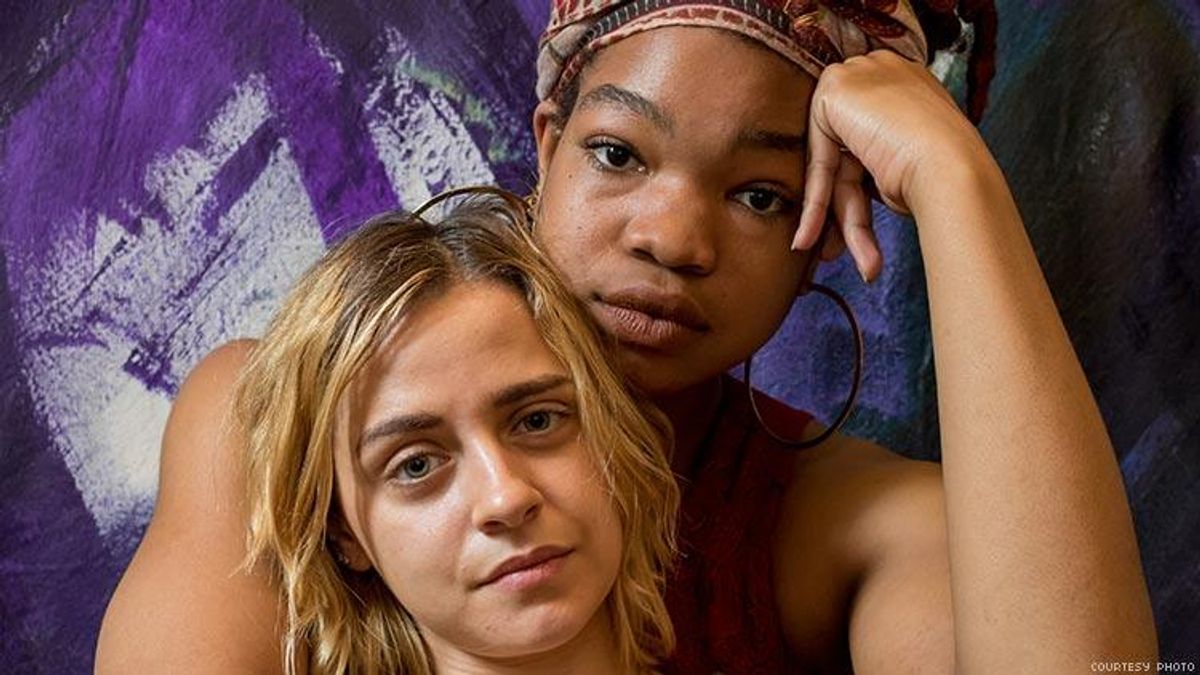As a lifelong Shakespeare fanatic, I was thrilled when Matt Minnicino and Hailey Bachrach shared with me their idea for a queer Romeo and Juliet, one with two women, one out, the other closeted, failing in love while at the same time discovering each other and themselves. Everyone has that traditional view of Romeo and Juliet in their head, but we haven't had anything like this -- and many of us may finally relate to it in a way we never could before. Now, in a time filled with escalating hate of all kinds, it seems more necessary than ever to bring life to a new version of Romeo and Juliet that speaks to LGBTQ communities and anyone else who feels like the "other."
So I got to work. Sharone Halevy became our production's fearless director and the pieces of the puzzle fell into place. We knew what story we had to tell. The idealization of love and how that creates all these scary expectations of what love should be and who we should want to be with is the heart of this story, and no community knows better the pain of exclusion from this ideal as much as the LGBTQ community. As we created this work, our goal has been to leave audiences feeling like they can now see love in a new light. As Sharone put it, "There's so much fear and misunderstanding in what it means to be anything but a cisgendered heterosexual." How could our production give audience members a little more understanding of what that really means?
And so this Romeo and Juliet has been put under a magnifying glass, with a focus -- and some creative twists -- on sexual and gender identities, specifically in the Capulet family. With their race and religion being guiding forces in who they are, how could their daughter, someone they loved so much, break past those barriers? And how could Juliet even begin to discover who she is when everything she is learning is setting the expectations that far too many of us have experienced in our families -- who and how we should love as well as our very basic identity.
Opposite Juliet stands her lover, Romeo. In our version, Romeo is a woman who had the benefit of growing up with parents who accept her without condition. Understandably, Juliet's world gets flipped by her loving someone who hasn't been bound by societal expectations and is free to be herself. And now Romeo's world changes when she finds a woman who is seemingly inaccessible and trapped in a family who opposes who she truly is.
Those are just some of the themes and questions our incredible cast and crew are grappling with in Romeo/Juliet, in addition to the intense amount of violence that is featured in the text -- a violence being seen in a whole new light as we deal with the very timely issue of hate crimes against individuals based on their race, gender, and sexuality.
Our cast members, who span across the LGBTQ+ and nonbinary spectrum, are actively engaged in the process of creating this work, contributing their personal stories of how societal expectations placed on them affect their day-to-day relationships with friends and communities. Many of the conversations revolve around how each of our characters is grappling with being an "other" against the expectations set for them. That Mercutio and Benvolio are white men in their community dealing with the idea of "toxic masculinity," yet their pansexuality and asexuality defy stereotype and turn them against the more traditional ideas of "Montagues" or "Capulets." And the Capulets, the biggest proponents of conservatism in our show, face judgments as an interracial couple.
Besides having a phenomenal cast of actors, we are performing this show in Metro Baptist Church's beautiful space. The church is a longtime supporter of LGBTQ+ homeless youth and a very fitting space for our production.
As Sharone put it, "Working on this LGBTQ+ production that tackles love, faith, and what it means to identify yourself inside of your community will have a massive underbelly and responsibility within the four pillars of a church." There's no escaping faith and how our faith influences so much of who we are as humans.
I hope those who come to see Romeo/Juliet will see that every single choice has been deliberate -- down to our choice of changing the title from "and" to "slash" -- and of course the analysis of expectations and how they affect who we think we are. How these expectations create fear, anxiety, and anger but also how they can create dreams, romance, and love. Every character's goal in this show is to fully act out of love; it's just when our expectations of what love is remain in conflict with others' that life begins to get messy and ultimately devastating. And that is a story we can all relate to.
Romeo/Juliet premieres in New York City August 24. Click here for tickets and more info.
LAURA ELLIOTT is a producer and actor in New York City committed to telling inclusive stories and creating female-focused work. Since her recent move from Chicago, she has had the opportunity to intern with the Bushwick Star and production manage Oye Group's "Shake on the Block," which teaches Brooklyn students to adapt and perform Shakespeare.


















































































Fans thirsting over Chris Colfer's sexy new muscles for Coachella